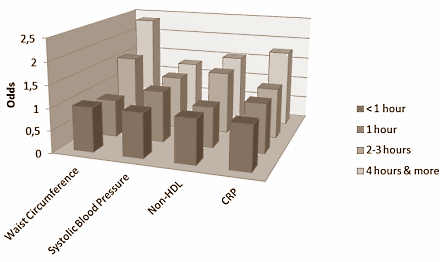|
One gram powdered ginger daily helps prevent almost every chronic disease
Chronically raised concentrations of inflammatory factor CRP in your blood are a recipe for all sorts of disaster. High levels of CRP mean an increased risk of cardiovascular disease, diabetes, Alzheimer's and many other chronic diseases. CRP interferes to a greater or lesser degree in nearly all chronic diseases. Fortunately, daily supplementation with one or more grams of powdered ginger - yes, the ordinary stuff you buy at the supermarket - can drastically lower the concentration of CRP in your blood. This according to a meta-study recently published in Food & Nutrition Research.
Study
The researchers tracked down 9 reliable trials in which participants had been given powdered ginger. They put the data from the trials together and re-analysed it.
Results
In all the trials, ginger supplementation resulted in a lower CRP level. The effect was pretty strong. Click on the figure below for a larger version.


In the studies used in this meta-analysis, participants received 1-3 g powdered ginger [1 g powdered ginger is a level teaspoon] for a period of 60-90 days. Higher doses had slightly more effect than lower doses.
Supplementation with ginger also improved cholesterol levels and insulin balance, although these effects were modest.

Mechanism
"It has been stated that the inflammatory marker CRP in adults has value for treatment initiation in individuals with intermediate CVD risk," the researchers wrote. "Regarding the mechanism of the effect of ginger on PGE2, an inhibition of cyclooxygenase-2 mRNA expression and direct inhibition of this enzyme activity is proposed."
"Furthermore, it has been reported that the effect of ginger on inflammation is also due to the effect of certain active compounds (gingerols and zerumbone) that inhibit NF-kB and TNF-alpha expression in liver cancer cells."
"6-Gingerol and 6-paradol have strong and effective anti-inflammatory activity and suppress TNF-alpha production. This inhibition decreases NF-kB activity in addition to other inflammatory cytokines as well as cyclooxygenase 2 and its associated products including PGE2. Therefore, acute-phase proteins such as CRP are also inhibited in this process."
"Moreover, other possible mechanisms are proposed regarding pharmacological activity of ginger. Ginger suppresses leukotriene biosynthesis by inhibiting 5-lipoxygenase l, and ginger extract was found to inhibit beta-amyloid peptide-induced cytokine and chemokine expression in a cell line of human monocytes."
Conclusion
"This systematic review showed that ginger supplementation can improve CRP level, glycaemia indexes, and lipid profile, which can be useful for the prevention and management of disease," concluded the researchers.
"Randomized control trials with a larger sample size and a longer follow-up period should be considered for future investigations to give an unequivocal answer as to whether ginger can reduce CRP and improve glycaemia indexes and lipid profile."
Source:
Food Nutr Res. 2016 Nov 1;60:32613.
More:
Not eating a few hours before sleeping lower CRP & inhibits cancer cells 18.08.2017
The more CRP, the quicker death comes 17.11.2016
Archives:
Ginger
|







